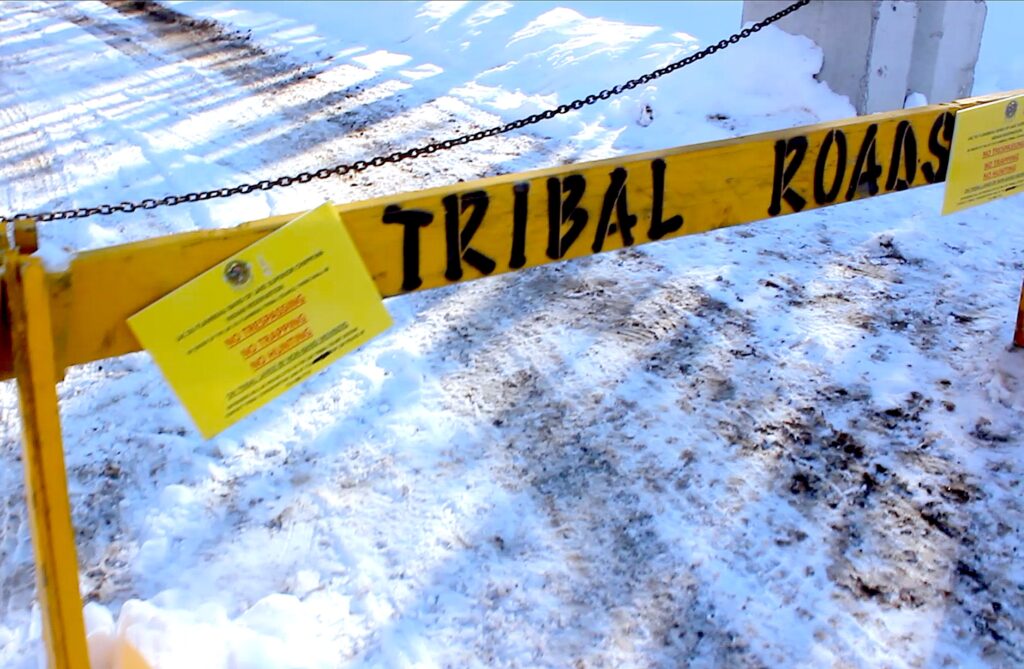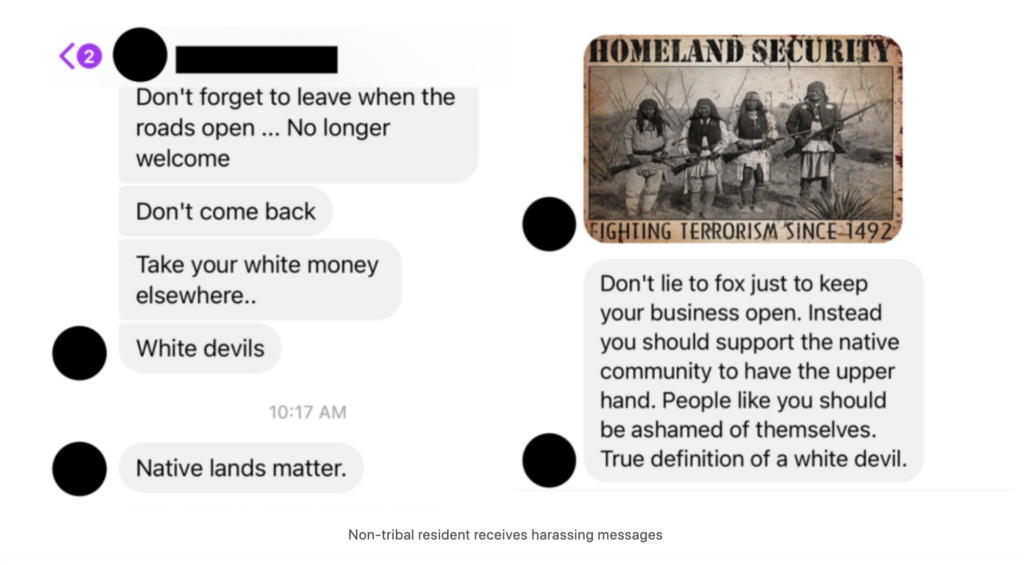Wisconsin Indian Hostage Crisis Teeters On Violence Because Biden, Tony Evers Do Nothing
Some 65 non-tribal Wisconsinites cannot enter or leave their homes due to barricades erected by the Lac du Flambeau Band of Lake Superior Chippewa. According to Republican Rep. Tom Tiffany, the barricades are illegal because the closed roads receive public funding.
For over a month, the only way non-tribal residents have been able to leave the reservation is by crossing frozen lakes, which are quickly melting with spring. Racial tensions and the threat of violence are also rising as the residents grow desperate, the tribe refuses to negotiate, and the government ignores the crisis.
Why Are the Barricades There?
The Lac Du Flambeau Reservation looks like patchwork, with sections of the land owned by non-tribal residents. The now-blockaded, non-tribal residents living on the reservation had right-of-way easements to their homes for sections of four roads owned by the tribe, but those easements expired more than a decade ago.
With the easements long expired, tribal President John Johnson has closed the roads and is demanding $20 million from two title companies to reopen them for only 15 years. Residents, the title company, and the town say the easements are not worth $20 million.
“Our town has a budget of around $2 million a year,” said blockaded resident Joseph Hunt. “And no title company in the world would come up with the $20 million they were asking for just … for a small amount of houses.” The worth of the roads remains in question because, according to people familiar with the matter, the tribe has barred anyone from viewing the roads’ rights-of-way appraisals.
The reason easements were allowed to expire for over a decade is complicated. The tribe claims the title companies have not “negotiate[d] in good faith,” whereas the attorney hired by one of the title companies to represent the non-tribal residents says the tribe has been slow in responding and negotiating for years. Both parties say the Bureau of Indian Affairs (BIA) has been unhelpful and unresponsive.

It’s worth noting many residents told The Federalist that prior to the barricades, the tribe had not been maintaining the roads despite receiving public funding to do so since at least 2018. Instead, the town, or in some cases the residents themselves, have been paying for the upkeep. The Federalist reached out to the town for confirmation but did not hear back.
What is undisputed is that the tribe is refusing to negotiate and that it receives federal funding from the Tribal Transportation Program, which Tiffany and the landowners maintain makes the blockades unlawful.
Soon They’ll Be Prisoners
Since the road closures, residents have been unable to go to work or school, get groceries, or take out their garbage without crossing frozen lakes. Once the ice melts, “we’ll be actual prisoners,” said Hunt. Every day this week, the temperature in Lac Du Flambeau has reached above freezing temperature, and residents told The Federalist there aren’t more than a few days left before the lakes are unsafe to cross.
[Visit The Residents’ Website: “Behind The Barricades”]
“What’s going wrong with the United States of America where taxpayers are being illegally held from going into or out of their house, [but] everybody else in the world can walk freely across our southern border?” asked blockaded resident Marsha Panfil. “This is f-cking ridiculous.”
“People have been saying all along, ‘just rip the barricades down,’ and the residents have said ‘no, we don’t want this to be that aggressive,’” said blockaded resident Pam Kester. “We don’t want this to lead to violence, but I think it’s just around the corner.”

Kester is one of the residents who opted to leave town instead of relying on a frozen lake. She and her 17-year-old daughter Ming moved to Lac Du Flambeau in September from Iowa. They were attracted to the North Woods and the services the local school, Lakeland Union High School, could offer Ming, who has autism and reactive attachment disorder.
Kester said that before the barricades went up, Ming was “flourishing” at Lakeland, but since they’ve been forced to leave town, things took a turn for the worse. Ming has “taken this really hard,” said Kester, explaining that due to the stressful situation, she’s been struggling with depression and her sleep patterns, and was even admitted to the emergency room last week due to a severe panic attack. Kester is trying to keep Ming enrolled at Lakeland, but Ming has struggled with the consequential remote learning and has had to drop all her classes except one.
“At the school that I went to before [in Iowa], I was getting bullied a lot and that was really hard for me,” Ming told The Federalist. “Lakeland was just much different. I liked all my teachers at the school. I was making friends there, and it’s usually hard for me to make friends.” All Ming wants is to go back to school, but she said she’s beginning to “lose hope.”
Like most residents The Federalist interviewed, Kester was not even aware of the expired easements. “Nobody told us,” she said, “not the previous owners, the realtors, or the title company.” “Our lives are trashed right now,” she added. “It feels like we’re collateral damage” and “nobody is taking responsibility.”
Biden and Evers Abandon the People
According to a former deputy assistant secretary of Indian affairs, whom The Federalist granted anonymity to speak freely, there’s some precedent for how to handle the ongoing hostage situation. In 2020, two South Dakota Indian tribes set up Covid checkpoints on federally funded roads leading into the reservation. Similar to the Lac Du Flambeau barricades, the Covid checkpoints prevented certain non-tribal residents from using the roads.
In response, South Dakota Gov. Kristi Noem “got involved,” said the former BIA deputy, and she appealed to the Trump administration, which in turn threatened to pull the tribe’s health-care and coronavirus relief funding. After that, the roads opened. “Theoretically, you could have the governor of Wisconsin call for the roads to immediately open,” said the BIA deputy.
But neither Biden nor Evers have taken any steps to make the tribe remove the illegal barricades or come to the negotiating table. Meanwhile, the tribe has received more than $218 million in federal funds over the past 10 years. Why Evers and Biden are allowing the tribe to engage in dangerous and illegal activity while receiving an exorbitant amount of federal funding remains unclear.
Not only has Evers refused to advocate on behalf of the residents, but he’s also allegedly affirmed the tribe’s supposed right to illegally erect the barricades. Hunt told The Federalist that when Evers visited Lac Du Flambeau in early February, “he met with the tribal council” and stated the tribe is “absolutely in the right to do this because [they’re] a sovereign nation. He didn’t talk to the town. He didn’t talk to the homeowners; he just left town.”
So far, Evers and Sen. Tammy Baldwin, D-Wis., have sent a letter to the BIA, asking that it be in “immediate engagement” and “aid in negotiations.” Tiffany and Sen. Ron Johnson, R-Wis., sent a letter to the Department of the Interior (DOI), of which the BIA is a subsidiary, and the Department of Transportation (DOT). According to Tiffany’s office, the BIA and DOT have been radio silent, and the DOI claimed it did not receive the letter the lawmakers sent a week ago.
The problem is none of these bloated government agencies have the organization or capability to do anything. “The BIA is very powerless,” the former BIA deputy told The Federalist, and the agency is “going to defer to the tribal government in d–mn near every situation.” This again means the only people with the ability to force the tribe’s hand are Biden and Evers.
The Government Refuses to Clean up its Mess
Hunt said it’s clear to him that “the tribe wants their land back.” Indeed, as tribal member Melissa Christensen told The Federalist last week, she believes non-tribal residents “shouldn’t have been able to buy [reservation] property to begin with.”
But the land owned by the non-tribal residents was obtained legally. Non-tribal residents are allowed to live on the reservation because of the 1847 Dawes Act, which broke up communally run reservations and distributed plots of farmland to each head of an American Indian family. This led to parts of the reservation falling into non-tribal ownership over the years.
Hunt told The Federalist he actually has “the bill of sale from the original sale of [my] property in 1923. I have a deeded access that says I can go out to the town road, and it’s all been ignored.”
Hunt said that if the tribe really wanted his and the other non-tribal residents’ property, they should have offered “a fair price” and bought them out. Instead, because his home is “worth nothing now” due to the barricades and government inaction, the tribe is “literally steal[ing] our homes.”
O
Of course, the tribe has no right to take the residents’ homes or erect the barricades. The blockaded roads are publicly funded, and the tribe is neither financially independent nor sovereign. Tribal members born on the reservation are born United States citizens on United States soil, and the supposedly “independent” tribes rely heavily on enormous amounts of federal funding.
The disastrous American reservation system was created by the U.S. federal government, yet the government is doing nothing to clean up its mess. Meanwhile, people like Ming and her mother are suffering.
There is no reason Evers and Biden can’t threaten to pull funding from the tribe if it continues to blockade citizens and refuses to negotiate. But as Kester told The Federalist, “Nobody wants to be accused of saying anything negative about the tribe.” That’s particularly true of Democrat politicians like Evers and Biden, who have built their political power on identity politics.





Post a Comment